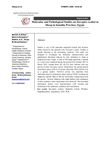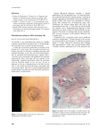 1 citations,
February 1977 in “Archives of Dermatology”
1 citations,
February 1977 in “Archives of Dermatology” Fresh plasma transfusions did not help treat Leiner disease in an infant.
 19 citations,
March 2013 in “Journal of Cutaneous Pathology”
19 citations,
March 2013 in “Journal of Cutaneous Pathology” The study found unique skin changes in a rare type of alopecia linked to a skin condition called linear morphea.
 August 2020 in “Egyptian Veterinary Medical Society of Parasitology Journal (EVMSPJ)”
August 2020 in “Egyptian Veterinary Medical Society of Parasitology Journal (EVMSPJ)” 10.5% of sheep in Ismailia, Egypt, had Sarcoptes scabiei, causing skin issues.
6 citations,
March 2018 in “Proceedings - Baylor University. Medical Center” Sarcoidosis can cause severe high calcium levels, hair loss, and kidney failure.
 19 citations,
January 2014 in “Facial plastic surgery”
19 citations,
January 2014 in “Facial plastic surgery” Dermabrasion improves skin appearance by removing the top layer to promote healing.

 January 2019 in “Springer eBooks”
January 2019 in “Springer eBooks” Acne is linked to inflammation and insulin resistance, and is associated with various syndromes that require different treatments.

The document discusses various diseases of the outer ear, categorized by symptoms like redness, crusts, bumps, pus-filled lesions, lumps, ulcers, and hair loss.
 2 citations,
February 2009 in “Journal of the American Academy of Dermatology”
2 citations,
February 2009 in “Journal of the American Academy of Dermatology” Many research paper titles in dermatology journals lack scientific precision.
 37 citations,
June 2002 in “The Laryngoscope”
37 citations,
June 2002 in “The Laryngoscope” Ectodermal dysplasia causes various symptoms and early treatment is important for eye, dental, and skin issues.
 2 citations,
January 2011 in “Elsevier eBooks”
2 citations,
January 2011 in “Elsevier eBooks” Early treatment of acne is crucial to prevent scarring and psychological effects.
1 citations,
December 2021 in “Animals” Low zinc and selenium levels in sheep are linked to hair loss and thyroid problems.
 2 citations,
January 2005 in “Elsevier eBooks”
2 citations,
January 2005 in “Elsevier eBooks” The document describes skin diseases affecting the outer ear in dogs and cats, their spread to other body parts, and treatment options.
 44 citations,
May 2006 in “The Journal of the American Animal Hospital Association/Journal of the American Animal Hospital Association”
44 citations,
May 2006 in “The Journal of the American Animal Hospital Association/Journal of the American Animal Hospital Association” Both treatments for pemphigus foliaceus in dogs are effective, but combination therapy has more side effects.
 1 citations,
January 2006 in “Elsevier eBooks”
1 citations,
January 2006 in “Elsevier eBooks” Cats lose fur due to various reasons, including allergies, infections, genetics, hormones, diet, cancer, stress, and some conditions are treatable while others are not.
 January 2019 in “Springer eBooks”
January 2019 in “Springer eBooks” Acne can appear or persist in adulthood due to hormonal changes, external factors, or substance use, and requires appropriate treatment.
 67 citations,
October 1997 in “Dermatologic Surgery”
67 citations,
October 1997 in “Dermatologic Surgery” The EpiLight Hair Removal System removed about 60% of hair with some side effects, and more research is needed to confirm long-term effectiveness.
 6 citations,
August 1991 in “Pediatric Clinics of North America”
6 citations,
August 1991 in “Pediatric Clinics of North America” The document concludes that various hair and scalp disorders in children have specific treatments and proper diagnosis is essential.
 5 citations,
October 2015 in “The American journal of pathology”
5 citations,
October 2015 in “The American journal of pathology” Mice with a mutated Dsg3 gene showed severe symptoms but not the typical blistering of pemphigus vulgaris.
 36 citations,
April 1990 in “Dermatologic Clinics”
36 citations,
April 1990 in “Dermatologic Clinics” Most pregnant women experience skin changes like darkening and stretch marks, and some may have skin conditions that usually get better after giving birth.
 March 2012 in “Pathy's Principles and Practice of Geriatric Medicine”
March 2012 in “Pathy's Principles and Practice of Geriatric Medicine” Older adults often have skin problems due to aging, and treating these conditions requires attention to both physical and mental health.
 31 citations,
April 2018 in “Royal Society open science”
31 citations,
April 2018 in “Royal Society open science” Sarcoptes scabiei infection causes significant health and behavior changes in wombats.
 13 citations,
February 2006 in “Clinical and Experimental Dermatology”
13 citations,
February 2006 in “Clinical and Experimental Dermatology” A benign tumor developed at a girl's BCG vaccination site, not previously linked to the vaccine.
 7 citations,
December 2011 in “Elsevier eBooks”
7 citations,
December 2011 in “Elsevier eBooks” The document concludes that early diagnosis and treatment are crucial for managing skin diseases in ferrets.
 55 citations,
October 2009 in “Clinics in Plastic Surgery”
55 citations,
October 2009 in “Clinics in Plastic Surgery” Burn reconstruction improves with new techniques, materials, and tissue engineering.
 30 citations,
December 1999 in “International Journal of Dermatology”
30 citations,
December 1999 in “International Journal of Dermatology” Oral ivermectin effectively cured scabies with minimal side effects, and finasteride promoted hair growth in men with hair loss.
 1 citations,
November 1953 in “Archives of Dermatology”
1 citations,
November 1953 in “Archives of Dermatology” The document discusses various challenging skin conditions and their treatments.
 10 citations,
October 2015 in “Journal of the International Association of Providers of AIDS Care”
10 citations,
October 2015 in “Journal of the International Association of Providers of AIDS Care” A woman with HIV had a severe skin condition that improved with antiretroviral therapy.
1 citations,
January 2023 in “International journal of molecular sciences” Rabbits with Sarcoptes scabiei had thicker skin, cell death, and skin hardening.
April 2019 in “Journal of parasitic diseases” A Persian cat and its owner fully recovered from Cheyletiellosis after treatment.


























